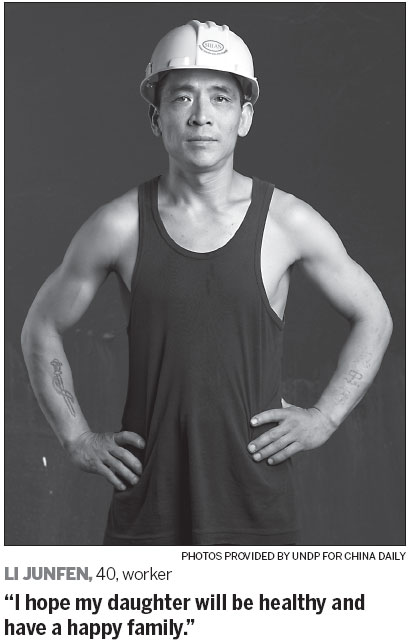Hope so!
Updated: 2012-07-23 09:17
By Xu Lin (China Daily)
|
|||||||||||


A 5-minute public-service film produced by the United Nations Development Program reveals what ordinary Chinese want for the world's future. Xu Lin reports.
The United Nations Development Program (UNDP) recently produced the 5-minute public-service film 2032: The Future We Want, which features 32 Chinese talking about what they hope the world will be like in 20 years, together with a commemorative photo album.
"It's short but very powerful," says director Du Jiayi, who won the Best Artistic Contribution Award at the 24th Tokyo International Film Festival in 2011.
"I want people to know hope is the most precious thing in everyone's heart. It's not common to hear the thoughts of ordinary Chinese people, which also represent people all over the world."

In 2011, UN Secretary-General Ban Ki-moon launched the global campaign "The Future We Want" to encourage people around the world to envision ways to build a world that promotes prosperity and equity, and improves life quality in an environmentally sound way.
In March, more than 3 million Chinese joined the discussion on Sina Weibo, a Twitter-like micro blog service, to share their visions of a sustainable future.
"It's exciting to hear what Chinese dream for the future, which reminds us that we're all part of the great human project of building a better world for all," Ban says.
"Good ideas come from anywhere, anyone, of any age. As for me, I want a world where everyone can prosper and be happy. This is the future we want."
Actress and UNDP National Goodwill Ambassador Zhou Xun also participated in the black-and-white movie and provided funding.
"Like I said in the movie, face yourself as well as others with a kind heart," Zhou says.
Du says it was great to work with Zhou due to their unspoken understanding, as they've been best friends for years.
"She revealed her true sentiments," he says.
"When she said she hopes she could still go fishing with her dad and quarrel with her mom after 20 years, I was moved to tears."
Du believes it's a pity that he only had five days to shoot the movie, and he could have done better if he had more time.
"What we lack most in modern society is hope," he says.
"People tend to complain about frustrations in life, but we still have hope."
Three assistant directors spent about a month in various places in the capital, such as subway gates, train stations and construction sites, to persuade passers-by to join the program. They asked nearly 500 people, and 232 agreed to visit the studio to share their hopes for the camera.
Du says interviewees were Han and from five other ethnic groups, including Hui, Zhuang and Yi.
The interviews also included children, university students, and migrant and white-collar workers, to ensure diversity.
"They could talk about whatever they liked," he says.
"The most impressive interviewee was a boy, who said he wanted to play on Mars and bring a Martian back to Earth. It's all about imagination."
Li Junfeng, a 40-year-old migrant worker at a construction site, says: "I usually work outdoors, but the weather is much hotter than before. It's the same in my hometown. I hope the climate will be cooler in 2032."
Journalist Wang Zi, 25, says: "I hope people will not judge success mainly by one's professional achievements. It was the first time that I was in front of a camera and it made me nervous. I have to learn to relax in life as well."
The film's cameraperson Xiao Quan says: "It's simple, clean and powerful to display their portraits in black and white. Everyone is equal and we don't need other colors. Their eyes are clear and bright, symbolizing human hope."
Du agrees. "I want audiences to focus on these people rather than being diverted by other things, as humanity is the most important element."
Contact the writer at xulin@chinadaily.com.cn.
Related Stories
Zhou Xun promotes UN Public-Service Film 2012-07-19 14:53
First horror film in cinema in China 2012-07-17 14:22
Just when you got digital technology, film is back 2012-07-15 14:13
Sheng: children should stay away from new film 2012-07-13 17:30
'Twilight' stars reflect on bittersweet end to the films 2012-07-13 08:58
Today's Top News
Rescuers race against time for quake victims
Telecom workers restore links
Coal mine blast kills 18 in Jilin
Intl scholarship puts China on the map
More bird flu patients discharged
Gold loses sheen, but still a safe bet
US 'turns blind eye to human rights'
Telecom workers restore links
Hot Topics
Lunar probe , China growth forecasts, Emission rules get tougher, China seen through 'colored lens', International board,
Editor's Picks

|

|

|

|

|

|





